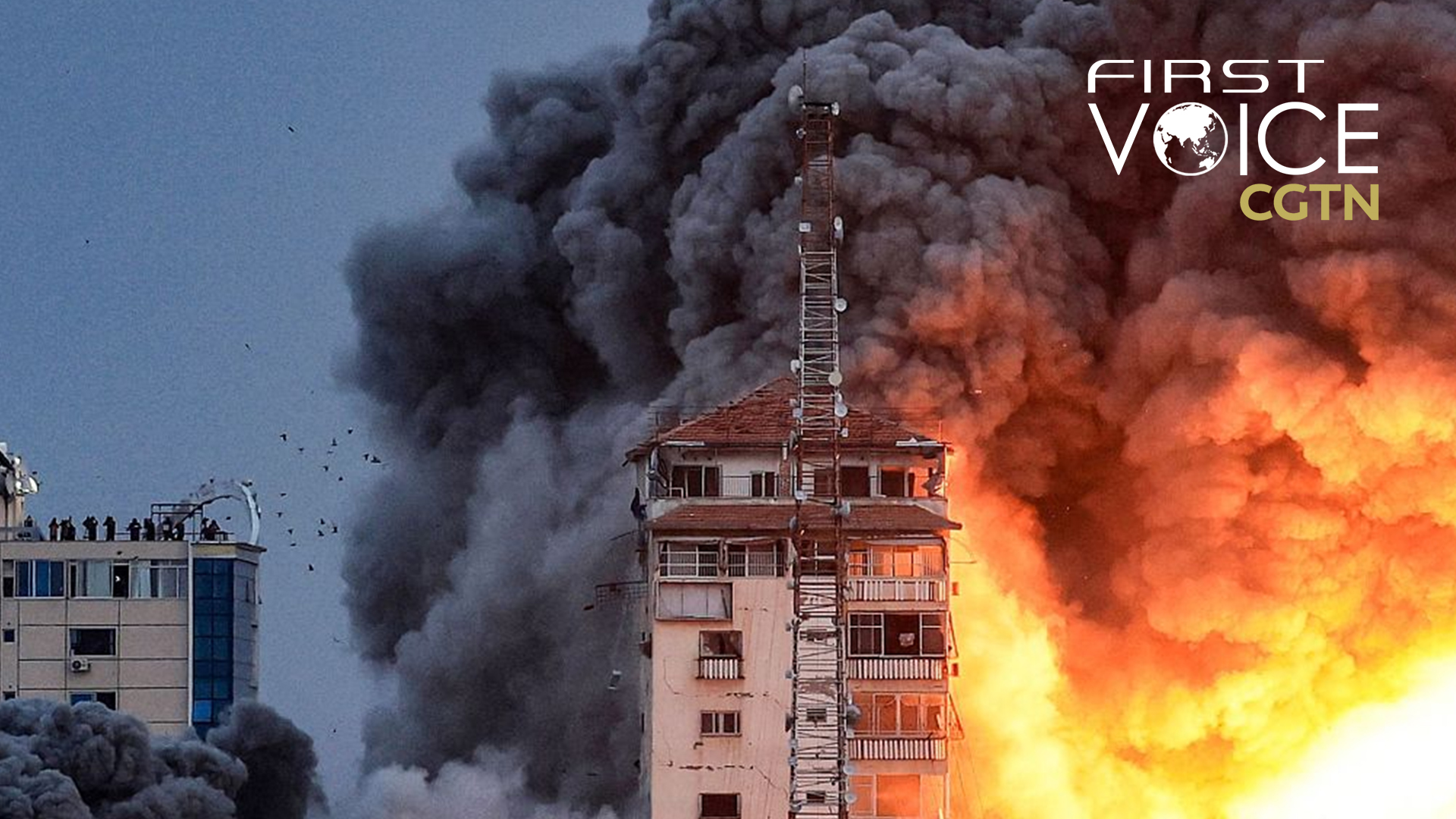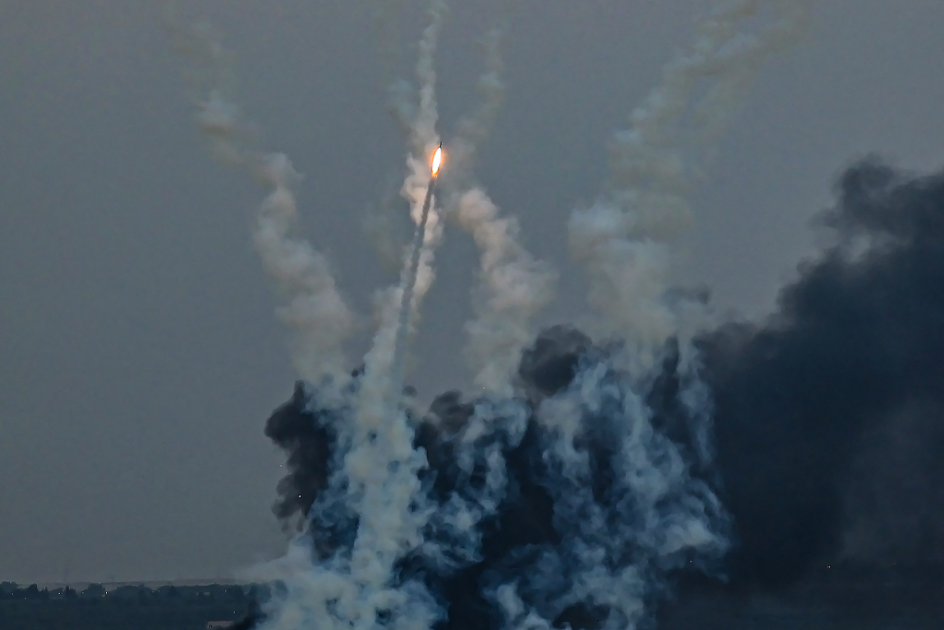
Editor's note: CGTN's First Voice provides instant commentary on breaking stories. The column clarifies emerging issues and better defines the news agenda, offering a Chinese perspective on the latest global events.
In the days following an unexpected Hamas assault on Israel that claimed the lives of hundreds of Israelis, the Palestinian-Israeli conflict continues to intensify. In response, Israel has launched airstrikes on Gaza, resulting in the deaths of hundreds of Palestinian civilians. Meanwhile, the United States is reportedly contemplating the deployment of a second aircraft carrier to the Middle East region, even as other nations endeavor to reduce tensions.
Why do Palestine and Israel find themselves ensnared in the perpetual quagmire of conflict? Seeking insights from rational voices on all sides can illuminate the underlying factors rooted in both historical and present-day realities.
A viable alternative to endless bloodshed
As Richard Haass, president emeritus of the Council on Foreign Relations, emphasizes: "There is no solely military answer." He underscores the necessity of introducing a diplomatic element into the equation, "including a credible Israeli plan for bringing about a viable Palestinian state."
So, what hampers the inclusion of this "diplomatic element into the equation?" Israel's discriminatory policies may provide part of the answer.
According to Daoud Kuttab, an award-winning Palestinian journalist, "Israel frequently prevents Palestinians from engaging even in peaceful political activity." These discriminatory practices not only contravene international law but are "also being implemented with brute force and intimidation." Behind the sudden escalation of the Palestinian-Israeli conflict lies the long-standing unresolved demands of the Palestinian people.
Violence threatens to spiral out of control unless substantial efforts are undertaken to ease the situation and provide political hope through a credible peace process.
Israeli Prime Minister Benjamin Netanyahu once claimed to have his "two hands firmly on the steering wheel." But now the wheel seems out of his control. However, some critics argue that it is Netanyahu's policies that have led to the current situation.
Just weeks ago, Netanyahu brushed aside the Palestinian issue during a speech at the United Nations, hailing the normalization of ties in 2020 with several Arab nations under the so-called Abraham Accords as "heralding a new era of peace."
Shlomo Ben-Ami, a former Israeli foreign minister, explained why this crisis was somehow doomed to happen. "By ruling out any political process in Palestine and boldly asserting that 'the Jewish people have an exclusive and inalienable right to all parts of the Land of Israel,' Prime Minister Benjamin Netanyahu's fanatical government made bloodshed inevitable."
China has called on relevant parties to remain calm, exercise restraint and immediately end the hostilities to protect civilians and avoid further deterioration of the situation.
A Chinese Foreign Ministry spokesperson emphasized that the recurrence of the conflict between Palestine and Israel shows once again that the protracted standstill of the peace process cannot last. The fundamental way out of the conflict lies in implementing the two-state solution and establishing an independent State of Palestine, the spokesperson stressed.

Palestinian militants fire rockets towards Israel from Rafah, southern Gaza Strip, October 11, 2023. /CFP
Palestinian militants fire rockets towards Israel from Rafah, southern Gaza Strip, October 11, 2023. /CFP
The U.S. role behind the conflict
In previous Middle East peace negotiations, the United States has shown favoritism and connivance towards Israel, hurting the Palestinians' confidence in Palestinian-Israeli peace. On issues such as the status of East Jerusalem, the right of return of Palestinian refugees, and Jewish settlements in the West Bank, the United States has repeatedly proposed solutions that are beneficial to Israel, condoning and acquiescing to Israel's occupation of the Palestinian people's land, and undermining the foundation of Palestinian-Israeli peace dialogue.
"The United States not only failed to reflect on its Middle East policy but also discredited the resistance of the Palestinian people," said Wang Jin, an associate professor at Northwest University of China. After the conflict broke out, the United States immediately defined Palestinian militants as "terrorists."
U.S. Secretary of State Antony Blinken directly asked Arab countries that have peace agreements with Israel to condemn Hamas' actions. Former U.S. President Donald Trump even used the "$6-billion prisoner swap deal" between the U.S. and Iran to attack Joe Biden, accusing that the same $6 billion financed the Hamas' attack on Israel. Some domestic public opinion in the U.S. also regarded Iran as the "chief culprit" of the Palestinian-Israeli conflict.
The consequences of the ongoing Israeli-Palestinian conflict have resulted in the loss of innocent civilian lives including thousands injured and displaced, as well as massive destruction to property. This round of conflict will inevitably leave a fresh scar on the Palestinian-Israeli issue.
The United States should join hands with the international community to promote the early resumption of peace talks between Palestine and Israel and seek a path to peace. Ignoring one's own moral responsibilities, transplanting others' mistakes to regional countries, or even exploiting conflicts for personal gain will only further increase the risk of regional confrontation and conflict, and will do no good to resolve the Palestinian-Israeli conflict, Wang Jin said.
(If you want to contribute and have specific expertise, please contact us at opinions@cgtn.com. Follow @thouse_opinions on Twitter to discover the latest commentaries in the CGTN Opinion Section.)